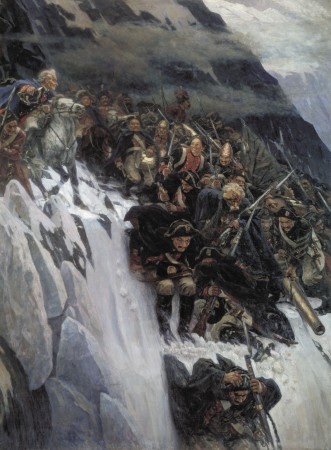For the first time since Tsar Alexander I in 1819, a Russian head of state is visiting Switzerland. Today, Russian President Dmitry Medvedev is coming for an official visit to the small Alpine country.
The main purpose of Medvedev’s visit is to celebrate the 210th anniversary of Russian General Aleksandr Vasiliyevich Suvorov’s victorious military expedition across the Alps, which resulted in the defeat of Napoleon’s occupying forces in Switzerland. Following Switzerland’s liberation from the French, the modern Swiss Confederation (more or less within today’s political borders) came into being.

Many Swiss living in the mountainous areas through which Suvorov’s triumphant troops passed remain deeply grateful to the Russian general, who is said to have never lost a battle and is seen as one of the greatest military geniuses ever to lead an army. He also coined phrases such as “To surprise is to vanquish”, ” Train hard, fight easy” or “Speed is essential, but haste harmful”. Both the Swiss and the Russian consider the Russian general a military hero. No questions asked.
The uncontroversial commemoration of Suvorov’s military campaign contrasts with Russia’s current efforts to protect the period of Stalin’s rule from ‘historical falsification’ and to revive the glory of Soviet military accomplishments in World War II. Russia has been eager to portray its army as a liberating power in Eastern Europe that made indescribable sacrifices in beating back the German army. Eastern European countries, especially Poland, have vocally opposed Russia’s World War II historical narrative, which often fails to mention the Molotov-Ribbentrop pact, suggests Polish complicity in German aggression and portrays the Red Army as a pure liberating force.
Russia’s ‘truth commissions’ and questions of historiography and historical memory in Russia are discussed in the ISN’s Special Report this week – check it out if you haven’t yet done so.
The fact that the official remembrance of Suvorov’s military expedition in the Alps is not stirring any public controversies – neither in Switzerland nor in Russia – can be considered refreshing in light of the complexities of 20th century world history. It is sometimes intellectually and politically convenient when historical events, especially when (or perhaps because) they lie so far back in the past, can be portrayed in black and white terms, generating heroes and villains and allowing countries to agree on which army served as a people’s ‘liberator’ (in this case, as long as you keep the French out of the discussion).
But you never know. It is sometimes said that Russia is a country with an unpredictable past. Perhaps neither the great general nor the Swiss will be spared future historical revisionism in Russia.


One reply on “Commemorating the General”
Your description of the military success of General Field Marshal Suvorov’s in Switzerland does not cover the whole reality of the coalition’s campaign in Switzerland, and your statement that his role is not controversial anymore in this country cannot pass uncommented.
“Realpolitik” of our government – shaken by a series of foreign policy mishaps and growing international isolation – has paved the way for the commemoration in the Schöllenen in the presence of the Russian predsident, and the visit of president Medvedev to our country is a clear message to the Europeans that Russia wants to claim a historical justification for her strategic hold on Western Europe. This visit was the meeting of two states that are feverishly try ing to get rid of an image of rogue states, a term that may be used for the smaller one for white collar crimes on an international level, for the big one for it’s more than dubious record on human rights.
If you look at the newer literature on the events of 1799, a final classification would be premature, and would fall exactly into the category of historical revisionism you claim to combat, and which is fully and systematically exploited by the present Russian regime.
Furthermore, there exists still a deep East-West divide in Switzerland over the interpretation of the period between 1798 and 1805, as I tried to demonstrate in my latest blog.
As for the military side of the events of 1799, I recommend to you the lecture of:
a) Günther Reinhold: Le Alpi a Ferro e a Fuoco, Armando Dado Editore, Locarno 2002,ISBN 88-8281-109-3 and
b) Gotteri Nicole: La campagne de Suisse en 1799 Bernard Giovangeli, Paris 2003, ISBN 2-909034-35-6